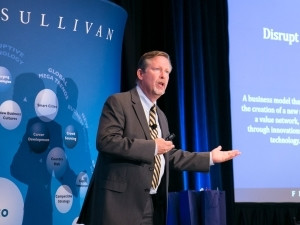
The rapid rate of change and the exploding number of new business models has occupied the minds of every business person in recent years. These new business models disrupt current ways of operating, which means that businesses need to think differently about innovation.
This is according to Dorman Followwill, senior partner and director for EIA at Frost & Sullivan, who gave the keynote address at Frost & Sullivan's annual GIL Africa congress, which took place in Cape Town yesterday.
"Over the last 10 years, our volume of innovation effort has produced some interesting results. The trend over this period was to spend the most time and resources on product performance. Despite pouring their heart and souls into this area of the business, this is not where organisations are deriving the most value," he noted.
"This tells us that we need to think about innovation differently," Followwill continued. "We have to ask ourselves where the greatest value is derived. And when we ask this question we will find that the rewards lie in business models and strategic partnerships."
Running a race
Followwill likened the rise of new business models, and the innovations that occur as a result, to an Olympic race. He outlined three basic categories of business models - disruption, collapse and transformation.
During the disruption phase of the race, the business is being hounded by its competitors and the challenge is to stay ahead, he said. "A disrupting business model leads to the creation of a new market or value network, usually through innovations in new technologies."
As an example, Followwill highlighted the emergence of on-demand taxi apps like Hailo out of the UK and Uber, which originated in the US but is operational in 100 cities and is currently growing at 18% per month. "These two companies are disrupting forces. Simply by changing the way that you and I get a taxi." He also mentioned ParkatmyHouse, a service that allows people living in busy cities to rent a spot from a parking space owner living in the area.
Followwill went on to discuss the collapse phase of the new business cycle, which he described as being similar to what occurs when an athlete suffers an injury during the race and has to stop competing. "This is where there is complete redundancy due to a new process or the shutting down of an old process, business or even an entire industry due to the advent of new technology or radically new innovations."
He cited trends like digitisation, the rise of new technologies and changes in consumer demands or preferences as some of the factors that could lead modern organisations to collapse.
For Followwill, the fall of Kodak, a company that owned some of the greatest patents in digital technology in the 70s and 80s but failed to adapt with the times, as the perfect example of this phase in the rise of new business models. "Kodak was putting forward all of the innovation decades before other people were thinking about it but they didn't sweat about the innovations happening around them," he said. "Because Kodak was a slow moving beast, it was never able to change quickly enough and that is why this business disappeared."
Finally, Followwill outlined the transformation phase, a period during which existing business models are turned on their heads. By doing so, businesses are able to remain competitive, mitigate threats from new technologies and stay on top.
It is through this kind of keen focus on creating something new and innovative that we can look to change not just our companies, not just our individual business units or teams but maybe our industry, maybe Africa, maybe even the world.
Dorman Followwill, Frost & Sullivan
According to Followwill, on-demand Internet streaming provider Netflix is a perfect example of a business that disrupted an entire industry, has faced threat of a total collapse but managed to transform in order to remain competitive. In the face of growing competition from on-demand streaming services, Netflix adapted its offering by moving from being a content distributor to a content creator and delivery platform.
"Ultimately, it is important to keep track of all three," he noted.
During an interactive think tank session, attendees were encouraged to come up with their own unique convergence and disruption opportunity. A smart concept to help consumers select the perfect pair of sunglasses, a converged delivery solution, a wearable health tracker and a concept to deploy high-altitude drones to provide connectivity to people in Africa were suggested.
"It is through this kind of keen focus on creating something new and innovative that we can look to change not just our companies, not just our individual business units or teams but maybe our industry, maybe Africa, maybe even the world."
Share